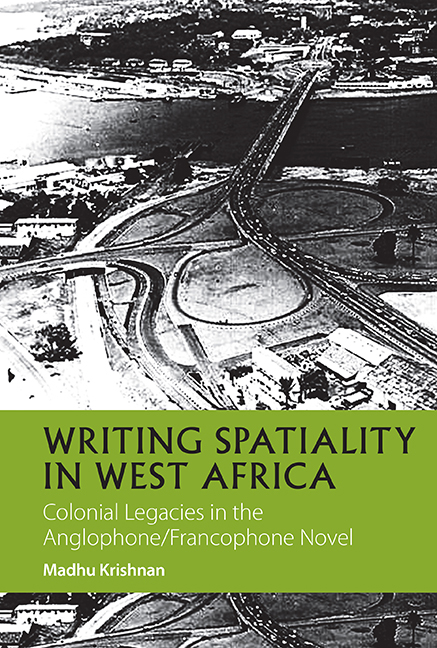Book contents
- Frontmatter
- Contents
- Acknowledgements
- Abbreviations
- Introduction
- 1 Spatiality from Empire to Independence
- 2 Post-independence Disillusionment and Spatial Closures
- 3 Social Space Beyond the Public Sphere: Women's Writing and Contested Hegemonies
- 4 Cosmopolitanism, Migration and Neoliberalism in the Wake of Structural Adjustment
- Conclusion
- Bibliography
- Index
- Frontmatter
- Contents
- Acknowledgements
- Abbreviations
- Introduction
- 1 Spatiality from Empire to Independence
- 2 Post-independence Disillusionment and Spatial Closures
- 3 Social Space Beyond the Public Sphere: Women's Writing and Contested Hegemonies
- 4 Cosmopolitanism, Migration and Neoliberalism in the Wake of Structural Adjustment
- Conclusion
- Bibliography
- Index
Summary
In his now-canonical essay, ‘Of Other Spaces’, Michel Foucault opens by arguing:
The great obsession of the nineteenth century was, as we know, history: with its themes of development and of suspension, of crisis and cycle, themes of the everaccumulating past, with its great preponderance of dead men and the menacing glaciation of the world. […] The present epoch will perhaps be above all the epoch of space. We are in the epoch of simultaneity: we are in the epoch of juxtaposition, the epoch of the near and far, of the side-by-side, of the dispersed.
In the years since the publication of this sweeping assertion, few disciplines in the humanities seem to have taken Foucault's words as seriously as postcolonial studies, here conceived of as a related cluster of scholarly perspectives in the humanities and social sciences, spanning literary criticism, political science, sociology, history and more. Indeed, since its legitimisation as an academic discipline with the 1978 publication of Said's Orientalism, postcolonial studies has placed space, in all its many forms, as central to the project of colonialism and its afterlives. Viewing the efficacy of colonial conquest as one enacted through a ‘series of intrinsically spatial strategies’, space has become a primary category through which the full reach of imperialism's work may be exposed, analysed and contested. In a certain sense, this is a statement that goes without saying: predicated on the physical and geographical conquest of the non-European world, colonialism, in its eighteenth- and nineteenth-century century instantiations, was fundamentally about the control of space and place, the rights of habitation and the economic deprivation of geographical locations. At the same time, there is another sense in which space has remained central to the discipline, captured in Ato Quayson's observation that ‘[e]ven when the term postcolonialism is being deployed exclusively for periodizing purposes […] the nature of what is highlighted insistently invokes spatializing processes’. Through its ‘projection of a series of sociopolitical dimensions upon geographical space’, the very ethos of postcolonial criticism remains inherently intertwined with spatial precepts. Space, as Soja reminds us, functions as more than simply an absolute container or matter of lines on a map.
- Type
- Chapter
- Information
- Writing Spatiality in West AfricaColonial Legacies in the Anglophone/Francophone Novel, pp. 1 - 28Publisher: Boydell & BrewerPrint publication year: 2018

